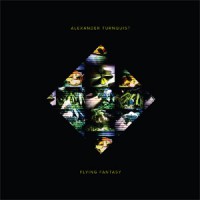Perhaps the most strikingly beautiful thing about Flying Fantasy is that it’s born out of a period of awful pain for young composer/guitarist Alexander Turnquist. After a seized-up nerve in his hand required surgery and for him to re-learn how to play the guitar, work on the album was further thrown into disarray by a severe bout of meningitis that he is still overcoming. I think the word is "crikey", and many would have thrown in the towel and given up on their art after so much duress. Instead, it appears to have galvanised Turnquist, resulting in an album that is traversed by pain but aims towards beauty as a form of balm.
Turnquist is a remarkable 12-string guitarist, and if it has been considerably diminished by illness, it doesn’t show on Flying Fantasy. Like nearly every fingerpicker that emerges from America, comparisons to John Fahey and James Blackshaw have been bandied around, but Turnquist sounds unlike either. His notes tumble out of his guitar in cascades, liquid myriads of melody that shimmer with emotion and feeling. On their own, they would lend a starkness to Flying Fantasy that would possibly not cover the breadth of Turnquist’s vision, but as he’s also a talented composer, he has succeeded in creating a sequence of lush, varied and ambitious tracks on which to flesh out the foundations set by his guitar.
On the album’s opener – and most effective track – ‘House Of Insomniacs’ (a reference to hospital, maybe?) is a demonstration of fluidity and control in equal measure. After a short overture of resonating plucked chords, the piece gathers momentum with a driving central guitar melody that Turnquist adds to and embellishes whilst also allowing lingering moments of contemplative silence. The introduction of lustrous strings, melancholic piano and dramatic horns, not to mention a ghostly wordless choir swells the track up to near-symphonic levels, the circular nature of Turnquist’s music never becoming redundant or repetitive, instead allowing the listener to hone in on details, or sit back and let the music fill the senses. Every track feels delicate, fragile even, as if instilled with the essence of the butterflies that adorn Flying Fantasy‘s cover.
More portentous than its predecessor, ‘Finding The Butterfly’ is dominated by mournful violins, an almost doomy organ and the restlessness of Turnquist’s guitar, which surges and recedes in a flurry of high-pitched arpeggios. The horn arrangements are most effective on ‘Red Carousel’, an homage to Ray Bradbury’s surreal horror novel Something Wicked This Way Comes, settling uneasily around the central guitar-and-voice duet like ominous clouds. The title track, meanwhile, is almost austere by comparison, with loamy electronics, drifting ambience, and the most minimal of twelve-string interjections. The imagery conjured up is one of vacant shorelines and parting clouds, a nicely understated expression of hope after hardship, and a strangely moving counterpart to the album’s busier moments. On Flying Fantasy, Turnquist neatly sidesteps the temptation to brood over his recent traumas, instead offering a more nuanced, gently unpredictable expression of pain and redemption, and the album, whilst tantalisingly brief, is all the better for it.
<div class="fb-comments" data-href="http://thequietus.com/articles/15518-alexander-turnquist-flying-fantasy-review-2” data-width="550">


